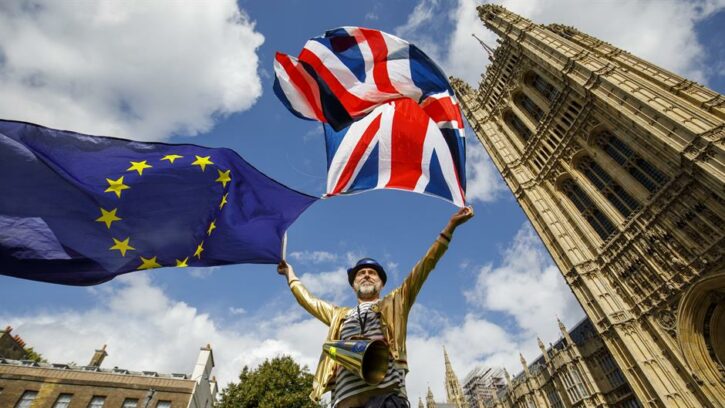
On Tuesday, British MPs face a choice that will affect the country's 66 million citizens for many years to come.
They will either vote to support Prime Minister Theresa May's Brexit deal, negotiated with the European Union, and set the country on its final road to leaving the EU on March 29. Or they will vote against it, leaving the UK Parliament, and the country, in the state of limbo it has inhabited for two-and-a-half years.
By every calculation and prediction, May will lose the vote. Her ruling Conservative Party and its ally, the Democratic Unionist Party (DUP), hold a bare majority in the 650-seat Parliament, but some estimates predict May's Brexit bill could be defeated by more than 100 votes.
Last ditch
The Prime Minister has spent the past week pushing hard for support for her deal, wielding both carrots and sticks – drinks receptions at Downing Street for wayward Conservative MPs and soothing phone calls to opposition Labour members; and threats that failure to support her deal would lead to Brexit being canceled and paralysis in Parliament.
The PM told the House of Commons on Monday that a “no deal” Brexit could lead to the break up of the United Kingdom and appealed to MPs to give her plans a “second look.”
Even EU leaders tried to help May's campaign by issuing a statement on Monday setting out assurances that the controversial backstop, an insurance policy to prevent a hard border in Ireland, would only be temporary – but pro-Brexit lawmakers remained skeptical because the assurances carried no additional legal force.
And so, barring a few MPs who changed their minds, it does not look like May's attempts at persuasion have worked. The big question in Westminster is now no longer whether or not she wins, but who will take control of the fallout narrative.
May's aides in Downing Street are scrambling to ensure the Prime Minister looks in command of events, even if she loses badly.
It is likely she will deliver a speech in the Commons shortly after the vote setting out her next steps, including possibly an alternative plan that she can take back to the European Union for approval – and then get through Parliament.
Yet factions in all political parties will be poised to fix their own narrative, too. Pro-Brexit Conservatives, who tried and failed to unseat May as Prime Minister in a confidence vote last month, believe Downing Street is playing up reports that the margin of defeat for May's bill could be higher than 200 – making it the worst for a Prime Minister in British history – as a way of managing expectations and making a narrower defeat look like a minor victory.
These Brexiteers want to use the likely defeat to show that the government must take a radically different path – and leave the EU without a negotiated deal. This is the hardest of all Brexit models, but one which Euroskeptic Conservatives believe will give the UK their cherished dream of freedom from the EU.
Election time?
On the opposition benches, the Labour Party, led by Jeremy Corbyn, will demand a general election if May's bill fails, hoping to pave the way for fresh talks between a new government and the EU.
There is no indication that a motion of no confidence in the government introduced by Corbyn – which, if successful, would spark a general election – will pass. Even if Labour does take power, the party is as divided as the Conservatives on Brexit, and many of its MPs want the nation to vote in a more definitive way – through a second referendum that could see Britain remaining in the EU altogether.
Corbyn will face intense pressure from many Labour lawmakers and grassroots activists to back a second referendum as the only way to break the impasse if he fails to force an election.
There is a third main group who have set in motion a process to take control of Brexit: an informal coalition of MPs from all parties who are angling for a softer Brexit than the one envisaged by May's deal, one that retains economic ties with the EU, similar to the arrangement adopted by Norway – which occupies an highly unusual territory both in, and outside of, the EU.
It is this group that could form the center of gravity within Parliament amid the fallout from May's likely defeat.
Whatever happens, the UK Parliament will be the scene of a PR war, as opposition factions try to take control of Brexit from the political vacuum left by May's dwindling authority.
To a weary UK public, this spectacle is likely to dismay voters who do not know whether to take seriously warnings from government departments over the stockpiling of medicines and food and heavy traffic queues in the event of a no deal.
There are still 73 days left before Brexit, and the sense of uncertainty for ordinary voters is palpable.
Follow N1 via mobile apps for Android | iPhone/iPad | Windows| and social media on Twitter | Facebook.




